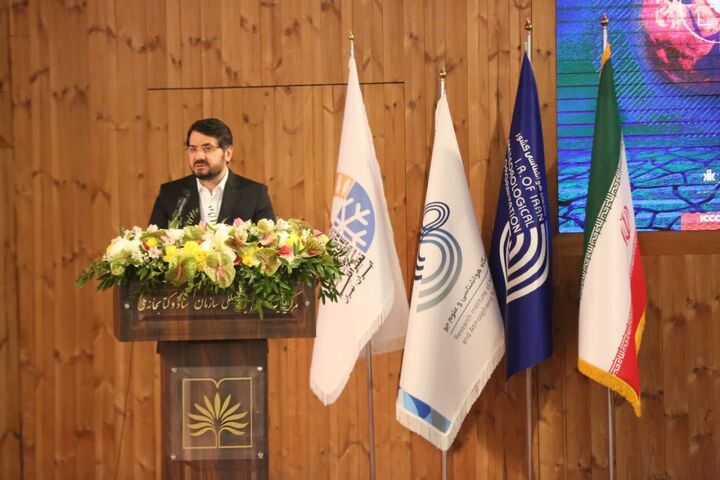Tehran, January 29, 2024 (MRUD NEWS)—The 7th International Conference on Climate Change are opened today on January 29, 2024 in Tehran by joint participation of Atmospheric Science and Meteorological Research Center (ASMERC), Iran Meteorological Organization, and Iran Ministry of Roads and Urban Development.
The two-day international event is held with the participation of 12 countries and five international institutions. Representatives from the World Meteorological Organization, the Intergovernmental Panel on Climate Change, the United Nations Educational, Scientific and Cultural Organization, and the Asian and Pacific Centre for the Development of Disaster Information Management (APDIM) participate in the event. Also, ambassadors and representatives from Germany, Italy, Switzerland, Nigeria, Nicaragua, Mali, Bolivia, Saudi Arabia, UAE, Pakistan, Venezuela and Uganda are attending this conference.
Addressing the conference, Iran Minister of Roads and Urban Development, informed of Iran's strategic policy to combat the impacts of the climate change with the expansion of the green economy and low-carbon industries. To this end, the climate change Bill will be prepared by the 13th government while simultaneously drawing on the Article 19 of the Clean Air Law which refers to the production of 30% of the country's electricity from renewable energy sources. The determination to fulfill this law will significantly increase the role of the Islamic Republic of Iran in the management of climate change in the region, Bazrpash stated.
Today, climate change is considered as one of the main challenges in the world leading to global warming caused by the increase in the concentration of greenhouse gases, the increase in temperature, decrease in precipitation and increase in destructive weather phenomena, especially in the last two decades. These impacts can negatively influence economic, social and environmental well-being in human societies. However, it has provided historical opportunities for the fundamental transformation in the development of technologies in the field of energy, Bazrpash continued.
He said the efforts to develop green energies such as solar, wind and peaceful use of nuclear energy make us move from fossil fuel power plants to clean and green energies to supply fuel and energy and this is one of the important achievements of this global challenge.
Based on global trends, it can be seen that the most appropriate option for diversifying Iran's energy resources is the development of renewable energies. Iran has good advantages in solar energy among other sources of renewable energy due to its geographical advantages in solar radiation. It can also export to the countries of the region, Iran Minister of Roads and Urban Development stated.
Bazrpash further proposed that all development projects need to have 'environmental appendix' through which a share of expenditures will be allocated to the environmental objectives of the projects. The main mission of this appendix is to protect country's climate against the negative changes.
Among other important proposals in this regard, Bazrpash added, is turning Iran into an international hub of clean solar energy in the region by using huge sources of solar energy in the central and southern parts of the county.
Planning and supporting knowledge-based companies in the promotion of new technologies relating to the power plants for the production of solar renewable energy, sea waves, wind and the export of these products, supporting universities and research with the aim of improving systems in order to reduce greenhouse gas emissions and energy systems with high efficiency as well as the possibility of multiple cropping due to the change in temperature and reduction or elimination of frost days in some areas are other solutions.
Considering the national and local capacities and by drawing on the experiences and research potentials of the elites and scientists, holding these scientific conferences with the presence of researchers and policy makers raise awareness and increase the country's scientific capacities in order to deal with the effects of climate change, Bazrpash reminded.
Deputy Minister of Roads and Urban Development and head of the Iran Meteorological Organization (IMO) Sahar Tajbakhsh also addressed the conference and said climate change is an important threat in the world, especially in developing countries, and this conference tries to examine different dimensions of climate change and its consequences, as well as issues related to sustainable development, adaptation, resilience and reducing its harmful effects. The 7th international climate change conference is a good opportunity to examine the latest challenges in this field through the eyes of researchers.
